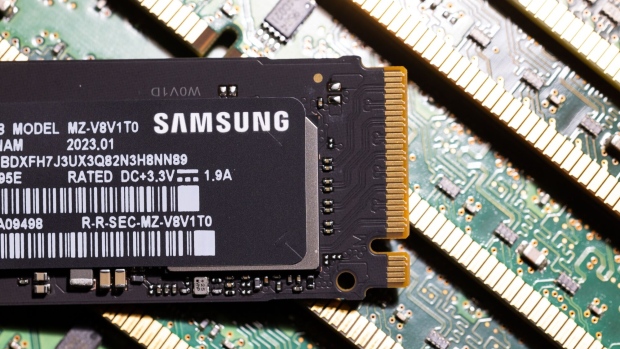Jan 30, 2024
Samsung’s Profit Falls Again on Uneven Chip Demand Recovery
, Bloomberg News

(Bloomberg) -- Samsung Electronics Co. posted its fourth straight quarter of profit decline in the holiday quarter, after a long-awaited recovery in chip and electronics demand delivered few returns for the world’s biggest memory maker.
South Korea’s most valuable company said net income fell 74% in the last three months of the year to 6.02 trillion won ($4.5 billion), after its mainstay chip operations posted a loss of 2.18 trillion won — bigger than what analysts projected.
A tax credit of 2.82 trillion won helped lift Samsung’s bottom line to nearly double what analysts had estimated. The company’s operating profit was 2.8 trillion won on sales of 67.8 trillion won, in line with preliminary figures revealed at the start of the month.
Shares were down 1.8%, underperforming both the broader Kospi and the MSCI Asia Pacific Index.
Samsung is working to catch up to rival SK Hynix Inc. in high-bandwidth memory, or HBM, chips, which are used to help Nvidia Corp.’s accelerators in training artificial intelligence. That has been one of the sector’s most promising markets.
“The share price is weak because its HBM lags behind SK Hynix and its foundry business is significantly behind TSMC,” said Lee Seung-Woo, an analyst at Eugene Investment & Securities, referring to Taiwan Semiconductor Manufacturing Co. “If Samsung improves on the two fronts, there may be expectations for better share price performance. But at the moment, there’s little expectation.”
Samsung said its HBM sales rose by more than 40% in the December quarter, and that memory demand showed signs of recovery, with mobile shipments expected to grow.
“We plan to pro-actively solidify our competitiveness as a leading HBM supplier,” said Kim Jaejune, executive vice president of Samsung’s memory business, adding that generative AI would drive demand. Samsung’s scale would help it push ahead to an upgraded version of HBM in the latter half of the year, he said.
Samsung said it spent 53.1 trillion won on capex last year, with 48.4 trillion of that spent on semiconductors, focusing on advanced nodes. That capex will take effect this year, Kim said. Samsung’s memory chip operations are expected to return to profitability in the first quarter, aided by continued recovery in DRAM, he said.
SK Hynix’s shares fell 1.3% during Wednesday trading in Seoul. Advanced Micro Devices Inc. gave a weaker-than-expected revenue forecast overnight, kindling concern about a patchy demand recovery and end-users holding off on PC and server purchases.
Samsung’s share price slide was despite its maintaining its dividend payout along with a pledge to return half of its free cash flow to shareholders in its latest three-year shareholder return plan.
Samsung’s foundry operations — an ambitious project to challenge TSMC’s lead — may not recover in the current quarter despite a rise in orders, Executive Vice President Jeong Gibong said. Customers are still reducing inventories to avoid a supply glut, he said.
Samsung’s latest figures leaven optimism about a fresh surge in demand for semiconductors driven by the artificial intelligence boom.
Fellow memory chipmaker SK Hynix posted a surprise profit earlier this month, with executives expressing a more bullish sentiment about prices growing this year. It added to a positive outlook from contract chipmaking leader TSMC, which drove a $165 billion rally in Asian chip firms, including Samsung.
Sales of AI-related chips have been constrained by limited supply, while consumer electronics demand has yet to return to growth. Smartphone and PC industry trackers, such as IDC, expect to see a halt to years of decline, albeit with only moderate growth to come.
As the provider of key components like displays, camera sensors and memory — alongside its own Galaxy device series — Samsung is directly affected by any fluctuations in global handset shipments.
Samsung expects the premium smartphone segment to grow this quarter, even while overall shipments will drop due to seasonality, Daniel Araujo, executive vice president of Samsung’s mobile division said. The company plans to offer AI software customized for its foldable devices and targets double-digit growth in shipments of its flagship devices, he said.
What Bloomberg Intelligence Says...
Samsung Electronics’ sales in 1Q could grow from a year ago, after declining 4% in 4Q. Operating profit in 1Q could strongly recover from a year earlier and sequentially. Its memory division, which made an operating loss in 4Q, may return to profitability in 1Q due to DRAM which returned to profitability in 4Q. Its NAND operating loss might shrink in 1Q due to better pricing. The company’s mobile division profit could grow sequentially due to new flagship smartphones in 1Q. Display profit in 1Q may fall from 4Q on seasonality.
— Masahiro Wakasugi and Phu Pham, analysts
Read the full report here.
--With assistance from Vlad Savov and Sam Kim.
(Updates with share reaction and analyst comment. An earlier version corrected the chart’s Y-axis to show values are in trillions of won.)
©2024 Bloomberg L.P.





